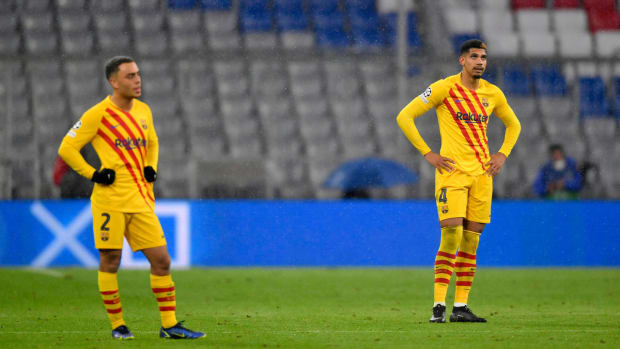Barcelona was sent tumbling to the Europa League knockout stage, confirming its competitive decline and costing the club prize money it can ill-afford to squander.
It’s hardly news that Barcelona is enmeshed in crisis, but every now and again there comes another reminder of just how far it has slipped. An emphatic, 3–0 defeat away to Bayern Munich, coupled with Benfica’s victory over Dynamo Kiev, means that, for the first time since 2003-04—the season before Lionel Messi made his first-team debut—Barcelona will not be involved in the last 16 of the Champions League. (It missed the '03-04 competition entirely. It's the first time since '00-01 that it reached the Champions League and subsequently failed to get out of the group.) The decline over a decade since it won the 2011 Champions League playing astonishing football, particularly in the years since its 2015 treble, has been profound.
There is perhaps a warning in that. No matter how established a superclub may appear to be, no matter how tactically advanced, no matter how well-developed the path from academy to first team, the possibility of collapse remains real. Barcelona was undone by its reaction to Paris Saint-Germain’s purchase of Neymar. It felt vaguely fitting that Ousmane Dembélé, the $150 million signing from Borussia Dortmund who has come to embody the squandering of that windfall, missed a decent early chance that might have changed the course of Wednesday's game.
The truth is, though, that it probably wouldn’t have. Bayern was just much better. If anybody thought the appointment of Xavi as manager, the hero returning to save the stricken club, might lead to a miraculous upturn, this was a chastening dose of reality. If there is a consolation, it is only that the Europa League is at least conceivably winnable for Barcelona, if it settles under Xavi, whereas the Champions League almost certainly would not be. And in terms of the long-term development of the club, of its resurrection, that is probably a more valuable staging post than a possible humiliation against an elite side in the Champions League knockouts (that's despite the apparent lack of self-awareness in the club's business office, which budgeted for Barça to reach the Champions League quarterfinals this season and receive the prize money that comes with it).

Imago Images
The situation at Barcelona is so bad, not just in terms of squad and finances but also morale, that it makes any fair and immediate assessment of Xavi almost impossible. If he succeeds, he is probably a genius. If he fails, well, that is hardly surprising given the circumstances. Those difficulties have been compounded by injuries, themselves perhaps in part caused by the additional workload caused by a short squad. Ansu Fati and Pedri were already missing Wednesday, and Jordi Alba was forced off with what appeared to be a hamstring injury on the half-hour mark.
There is a danger for somebody who is such a devout follower of the Pep Guardiola interpretation of Johan Cruyff's philosophy that he is a cargo-cult coach, capable of parroting the dogma without having the wherewithal to adapt it to circumstance or impart its tenets usefully to his squad. Certainly his start had not been at best a qualified success: just four goals scored in four games before Wednesday, including a league defeat to Real Betis and the 0–0 Champions League draw against Benfica that left qualification in the balance.
The gulf in class on Wednesday was at times embarrassing, particularly given that Bayern, having already qualified, was playing at something significantly less than full pace. Again and again Bayern, looking far quicker and more physically imposing than an increasingly ponderous Barcelona, got behind the high line, and eventually it paid off, with Robert Lewandowski crossing for Thomas Müller, who scored the 50th Champions League goal of his career with a clever looping header.

Imago Images/ULMER Pressebildagentur
When Leroy Sané added a second with a swerving long-range effort before halftime, Barcelona was done. Jamal Musiala added a third from an Alphonso Davies cutback after halftime, after which the game drifted to an anti-climactic conclusion. Barcelona's fate, a third-place group finish, was clear.
"We have to demand more from ourselves. We are Barcelona. This has to be a turning point to change the dynamics and many other things," Xavi said after the match. "We did not compete. This is the Champions League.
"But this is our reality. It is the situation we are in. We face the situation with dignity. Today begins a new era and a new stage.
"I am leaving angry. This is our reality and it pisses me off. We have to face it. There is no other option. Today a new era begins."
Perhaps this result can be written off. Bayern, obviously is a good side, and clearly there is a lot wrong at Barcelona. But the worry must be that Xavi seemed to be applying the old theories with little recognition of the reality. To play a line that high against a side with the pace of Lewandowski, Sané and Davies would always be a risk; to do so with a 34-year-old Gerard Piqué and Clément Lenglet, protected by the 33-year-old Sergio Busquets, was asking for precisely the sort of evisceration that came.
It’s very early days in Xavi's reign, clearly. There is a huge amount of work to be done and a squad that requires severe rationalization, to replace the aging players and sort out those who simply do not fit. There's no guarantee that Barcelona even makes next season's Champions League. There's plenty of season still to play, but it sits six points out of the the top four in La Liga. Ideally, the wave of promising young players could be introduced more gradually. Xavi, at least, as a club legend, is likely to be afforded more time than an outsider would be—although as Ronald Koeman can attest, legendary status can quickly be forgotten at Camp Nou.
But whoever is in charge, rebuilding Barcelona from its new bottom is an enormous task.
More Soccer Coverage: